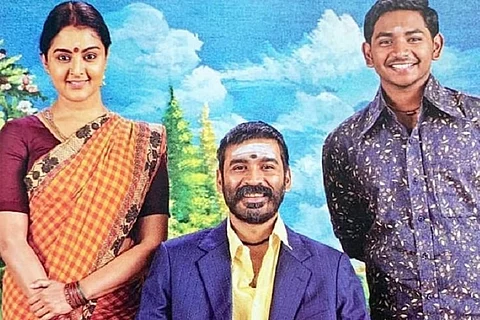‘Asuran’ review: Dhanush-Vetrimaaran’s film is a dark tale on caste violence
In popular and simplified versions of Hindu mythology, the asuras are demigods with evil attributes who are constantly battling the devas, who are considered to be good. The perennial fight is over who will rule the three worlds – swarga, bhumi and patala (heaven, earth, netherworld), and the asuras are typically characterised as greedy and asking for what is not rightfully theirs. By titling his film Asuran, Vetrimaaran, at the outset, defines the perspective from where he’s narrating the story – this is through the eyes of those who are beaten back for daring to ask for more. It is a story that validates the struggle of the ‘asuras’ and exposes the avarice of the ‘devas’.
Based on Poomani’s novel Vekkai (published 37 years ago), which means ‘heat’, Asuran follows a family of five in the ‘80s – Sivasamy (Dhanush), his sons Murugan (Teejay Arunasalam) and Chidamabaram (Ken Karunas), wife Pachaiamma (Manju Warrier) and their little daughter. They own a piece of land but it is under threat from Narasimha (Aadukalam Naren), called Vadakkooran, who wants it for his cement factory. However, it’s not a straightforward fight over property – the dominant caste Vadakkooran and his people see it as an affront that a Dalit family should stand in their way. Though caste names are not used for any of the groups, the references to panchami land (land assigned and distributed to the Scheduled Caste groups by the British in Tamil Nadu) make the social hierarchies clear.
The film begins with the family on the run – Sivasamy and Chidambaram in one direction and Pachaiamma and the daughter in another. With his wiry frame and youthful face, it’s difficult to buy Dhanush as the father of two grown boys. He looks more like their brother (which works to his advantage in the flashback) but the actor manages to make us move past this.
At the heart of Asuran is a conflicted father-son relationship. Chidambaram, who is nearly 16 but rather naive for his age, hero-worships the quick-tempered Murugan but looks down upon his father, whom he considers a good-for-nothing drunk. Chidambaram is still figuring out how to be a man and his father’s pliant attitude seems emasculating to him. In fact, except for Sivasamy, the men in the film are constantly out to settle scores (‘heat’ is also a reference to the blood, the impulse to lash out in the moment), and Chidambaram cannot understand why his father remains uninterested. Even his mother Pachaiamma (a fiery Manju Warrier whose Tamil has only a hint of the Malayalam accent) is capable of putting a sickle to a man’s neck, but not Sivasamy.
It’s only midway in their journey that Chidambaram discovers who his father really is, in a terrific interval block where Dhanush transforms from the quiet Sivasamy to an asuran who spills blood. GV Prakash’s rousing background score makes the sequence all the more impressive. However, one wishes that before Vetrimaaran brought us to this point, he’d built up the family in our minds some more – there’s a moment early on when Murugan goes for a bride-seeing ceremony and mumbles an excuse to go back and see her one more time. His father, of course, already knows his trick and says, “You’ve forgotten your keys? I know, I too have forgotten keys many times.” It’s the only light-hearted moment in the otherwise relentlessly dark narrative (with out of sync dubbing in places), a pause that humanises the characters. The brief romance in the flashback with Mariyammal (Ammu Abirami) is too generic and filmy to make that kind of impact.
In the novel, it’s Chidambaram’s desire for a return to normalcy that propels his actions, but in Asuran, his motivations are not explored enough. There’s too much focus on Sivasamy and too little on Chidambaram, making the violence predictable after a while as it keeps happening (as superbly choreographed as these scenes might be). The oppressed castes are repeatedly humiliated and the film effectively throws light on how ingrained the caste network is. The push-back, however, is limited to Sivaswamy – though there is some talk of consolidation among the oppressed, it stays strictly in the background. Prakash Raj plays a Brahmin communist lawyer who comes to Sivasamy’s aid. It’s a somewhat upper caste saviour role, except that his efforts don’t really emancipate Sivasamy’s family. And it appears that Sivasamy is aware that nothing much will change if his sons too follow his path – the frequent aerial shots (cinematography by Velraj) when father and son are attempting to escape underline just how lonely they are in this bloodthirsty jungle.
Asuran ends on a note that echoes Ambedkar’s commandments for emancipation, offering the viewer a slim hope for Chidambaram’s prospects. Interesting? Definitely. And difficult to watch at the same time.
Disclaimer: This review was not paid for or commissioned by anyone associated with the series/film. TNM Editorial is independent of any business relationship the organisation may have with producers or any other members of its cast or crew.

